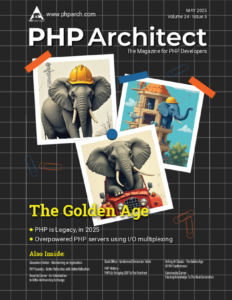Part 3 continues the series by implementing Goal 2, which begins working within the data warehouse. by Edward Barnard
As experienced developers, one of the most important things we can do is pass on our knowledge to the next generation. To do so, we have to meet them where they are and through various channels. by Scott Keck-Warren
PHP, originally conceived as a simple set of “Personal Home Page” tools by Rasmus Lerdorf in 1994, has evolved into one of the most dominant server-side scripting languages, powering over 79.2% of websites worldwide. This remarkable journey from a modest collection of CGI binaries to a sophisticated programming language reflects PHP’s ability to adapt and grow alongside the web’s evolving demands. by Christopher Miller
I’ve been attending conferences since 2003 and spoke at my first event in 2005. I would say with no hesitation that I owe my entire career to a decision I made more than 20 years ago to go to an event at a hotel across the street from one of Canada’s biggest shopping centers. There, I discovered that there were all sorts of other programming conferences out there and that you could get paid to go and speak. Almost 100 talks and workshops later, my decision to get involved with speaking at events allowed me to create an awesome professional life. by Chris Hartjes
Throughout this year, Education Station has been dedicated to helping you design and start to build your application, whatever it is. From taking advantage of new features in PHP to how to structure your code, the point has been to set you up for success. Some of it may seem like extra work, but with a good, solid foundation in how to build your code, you can move on to the maintenance of your code. by Chris Tankersley
Over the next few months, we’ll be diving into the world of cryptography together. We’ll start with the basics of traditional asymmetric cryptography, then move on to more advanced topics like elliptic curve cryptography and quantum-resistant algorithms. You don’t need to have any prior knowledge of cryptography to follow along, nor do you need to know anything about the mathematics of elliptic curves. ***Note:*** *Remember that any algorithms we build in this series should not be used in production. They’re just for educational purposes.* by Eric Mann
We’ve used reflection in our Spacetraders command-line client to automatically build information for the Help command. While powerful, PHP’s Reflection API is cumbersome and verbose, which led to the creation of BetterReflection, a userland wrapper with some nifty tricks up its sleeves, like no autoloading side effects. This month, we’ll use it to streamline route registration, automatically service discovery, and simplify our application architecture. by Oscar Merida
PHP, as its official website states, is a popular general-purpose scripting language that is especially suited to web development. However, many PHP developers don’t pay close attention to how exactly their applications are executed in the web environment. This article will show you how PHP applications are usually executed on the Web and how we can handle a much larger number of simultaneous connections than with the “standard” approach. by Vinicius Dias
> We travel in our jobs a lot at Vonage. I speak to plenty of developers from all walks of life, and I can confidently say one of the most asked questions I get is: Why do you still do PHP? Variations of this question can be “PHP supposed to be bad, right?” On several occasions, the person I spoke to did some PHP in 2012 or 2010 – I forget. For reasons I do not understand, we are going through another spate of this in online forums a lot, so more “PHP is terrible” comments are coming out of the woodwork. > >What causes this phenomenon? Why is PHP “bad”? by Jim Seconde






Leave a comment
Use the form below to leave a comment: